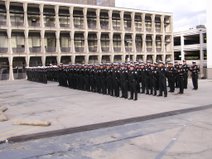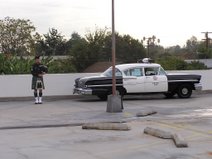
He was an Irish immigrant; a Chicago cop; an author; a scholar; a husband, and the father of ten children. He was also responsible for the gathering and publication of the largest collection of traditional Irish music ever assembled. His name was Francis O'Neill, and while he's greatly admired in the world of traditional Irish music, he has remained an obscure figure to the general public. In the interest of the 3,500 Irish songs he saved for posterity, it's time to make amends.
Francis O'Neill was the youngest of seven children. He was born in the year 1848, in Tralibane, County Cork. It was the last year of Ireland's Great Hunger. When he was 16, he ended up at sea. In our research we found one account that said he had an opportunity to become a teacher. In another, he was given a letter of introduction to the local bishop and his family sent him off to become a priest. Whatever the truth, other yearnings pulled him in an altogether different direction from either teacher or priest. He ran away and became a cabin boy on an English merchant vessel.
On one voyage, O’Neill and his fellow crew members were shipwrecked and faced the prospect of starvation, marooned on Baker Island in the middle of the Pacific. He retained strong memories of his childhood in Ireland where he learned to play the flute and listen to the musicians at Crossroad Dances near his home. O'Neill showed a native crew member on the ship that rescued them how to play Irish tunes on the native's crude wooden flute and, in exchange, he received extra rations of food. When they arrived in San Francisco, O'Neill was one of the only members of his crew who didn't have to be hospitalized for malnutrition.

Afterwards, he did some ranching in Montana, before going to Chicago by way of New Orleans and Missouri. In Missouri, he married a young lady, Anna Rogers, whom he had met when she was an outbound passenger on one of his voyages from Ireland. He served for a time as a schoolteacher in Edina, Knox County. In his book "Irish Folk Music," he provides one of the best descriptions of traditional music in 19th-Century Missouri:
"Not a week passed during the winter months without a dance or two being held among the farmers. Such a motley crowd - fiddlers galore, and each with his instrument. Irish, Germans, French...and the gigantic Kentuckians, whose heads were endangered by the low ceilings, crowded in, and never a misunderstanding or display of ill-nature marred those gatherings. Seated behind the fiddler, intent on picking up the tunes, was my accustomed post, but how much was memorized on those occasions cannot now be definitely stated. Three tunes, however, distinctly obtrude on my memory, A reel played by Ike Forrester, the "Village Blacksmith," which was named after him; "My Love is Fair and Handsome", and a quickstep, which I named "Nolan, the Soldier." Nolan had been a fifer in the Confederate army during the Civil War. His son was an excellent drummer, and both gave free exhibitions of their skill on the public square at Edina to enliven the evenings when the weather was fine."
In 1870, the O'Neills moved to Chicago. Francis originally had in mind to work as a sailor on the ore boats that cruised the Great Lakes. They still haul iron ore by ship from Duluth to the mills in East Chicago and Gary. But fate intervened and the Captain ended up as a patrolman on the Chicago Police force. He was on the force less than a month when he was shot by a burglar. He carried the the bullet, lodged near his spine, until his death. Even though he was wounded in the shoot-out he still managed to arrest the crook and bring him in.
Because of his intelligence and political savvy, O'Neill rapidly rose through the ranks. In 1901, he was named General Superintendent, where he earned respect for his efforts to reform what had been a corrupt police department. He was tough and he was honest, and he once even arrested an alderman - an action that could end a police career in those days.
At the same time, O’Neill was also pursuing his other passion - the performance and collection of Irish music. He wrote, “traditional Irish music could have survived even the famine if it had not been capriciously and arbitrarily prescribed and suppressed.” Ironically, it wasn't just the English who tried to stop the music - it was also some elements of the Roman Catholic Church.
The Captain gathered many of Chicago's Irish musicians in an organization that they called the Irish Music Club. With the help of the Club and James O'Neill, his nephew, he began to collect and publish the songs. He also became a champion for the music, as revisionists started to make claims that it might be of origins other than Irish.
O’Neill went to great lengths to unearth the music - and musicians who could play it. When he learned of Irish musicians in town, he'd track them down. The joke was he'd try to put them on the police force so he could keep them here!
"He would always be listening", said his great-granddaughter, Mary Lesch. "At times he would stop in front of shops and listen to merchants until he could play on a tin whistle he carried with him the tunes they were singing. If he heard a tune on a streetcar, he would stay on board until he could play it.”
Francis couldn't read music, but he had a sergeant in the department who could. He's play the tune he heard for the sergeant who would then write it out. He also delved into old books, letters, journals, manuscripts and diaries, cross-referencing various lyrics and tunes.
After he retired in 1905, he continued collecting, and by the time he died in 1936, he was credited with amassing about 3,500 songs, some dating back as early as 1550 or 1600. Many of them cannot be found anywhere else.
O’Neill eventually published eight books. Says Nicholas Carolan, author of A Saved Harvest, “It was the largest snapshot ever taken of Irish traditional music and we still have it.” In 1931, O'Neill donated his personal library to the University of Notre Dame. The collection includes first editions of his work, notably The Music of Ireland, now a classic in the field.

Francis O’Neill is revered today, 65 years after his death, because at a critical time for Irish culture, his books helped to keep Ireland’s music alive. Noel Rice, President of the Academy of Irish Music, has taught O’Neill’s music to his students for the past 25 years. “He did a magnificent job. . .of gathering it together and trying to keep it from dying.” Kevin Henry, an Irish piper who plays in the sessions at Chief O’Neill’s Pub1, says, “I have to take off my cap to the Chief; there was nobody like him.” Paddy Ryan, music officer of Comhaltas Ceoltoiri Eireann, the organization that promotes traditional music in Ireland, concurs. “He put Chicago on the map in the musical sense. Chicago is a very important place in the history of Irish traditional music. Extremely important place. Because of Francis O'Neill.”
Sadly, Francis O'Neill died a very disappointed man. He was convinced that once his fellow Irishmen in America heard the music, they would love it. But they didn't want to love it. They wanted to be American.
Ah, but if he were here today, he'd be as pleased as paddy's pig at the admiration and respect his work has earned. There's a statue honoring him in Co. Cork, he's an invaluable resource for students of Irish music both in Ireland and the US, and his work still has remarkable influence. An anecdote from Noel Rice serves to put this in the proper perspective: He recalled reading about some boys who would sit at the feet of an old musician, thinking they were learning the music the way generations before them had. "And this old man," he said, "was playing these lovely Irish tunes right out of O'Neill's book."
"Without him, the music would have died or it would have gotten changed so much the original never would have been remembered." Richard Jones, music librarian at the University of Notre Dame.
1Chief O’Neill’s Pub and Restaurant
This pub at 3471 N. Elston was opened in the fall of 1999 by All-Ireland musicians Brendan and Siobhan McKinney, to celebrate Chief O'Neill's life and achievements, and to keep his musical tradition alive and well in the city he loved.
Sources & Images:
Article in the Cincinnati Enquirer, by Dob Babwin, Associated Press




















